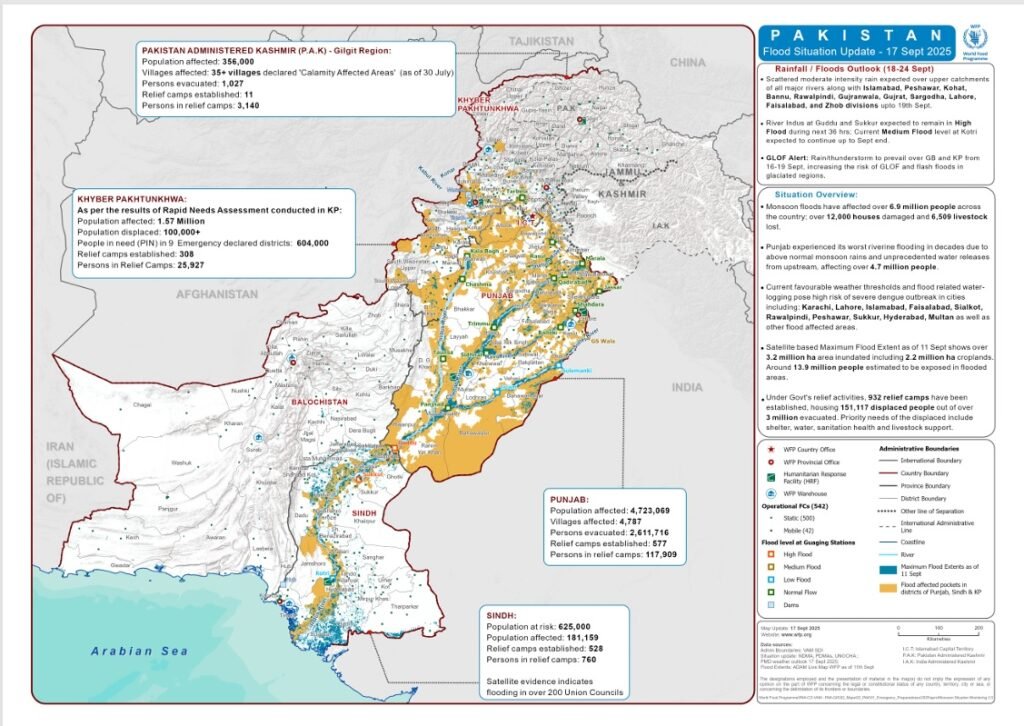The Learning Republic
Home > The Learning Republic
Freelancing & Floods in Pakistan 2025




The 2025 monsoon floods in rural Punjab, Sindh, and Khyber Pakhtunkhwa (KP) caused a lot of damage. More than 4,700 villages in Punjab were devastated, with over 4.7 million people affected and almost 2.2 million hectares of cropland underwater. More than 122,000 people were moved out of Jalalpur Pirwala tehsil and nearby areas, but many came back to find their homes gone and their fields ruined. The area of Buner in KP was one of the worst impacted; more than 150 people died, numerous homes were washed away, and many people are now living in temporary housing.
The losses in farming are huge: crops ruined, cattle lost, and irrigation systems wrecked. Farmers who used to rely on one crop season now go months without food and money. Freelancing, on the other hand, gives you a glimmer of hope in these terrible times. It lets you reconstruct your life even when your land fails you. Reading and writing skills and rural potential

Source: World Food Programme. (2025, September 17). Pakistan: Flood 2025 situation update – 17 September [Map]. ReliefWeb. https://reliefweb.int/map/pakistan/wfp-pakistan-flood-2025-situation-update-17-september

Chief Minister Punjab with Flood-Affected People. Providing them with Freelancing Opportunities can alleviate their sufferings
Literacy & Rural Potential
We typically think that low literacy in places impacted by floods means less chances. But the evidence tells a different story. In many rural areas of Punjab, Sindh, and KP, literacy rates have consistently climbed. In certain parts of rural Punjab, literacy rates are currently at 60–65%, in much of Sindh’s rural districts they are between 50–58%, and in KP’s rural tehsils they are also growing. This implies that millions of young people can read, write, and use digital tools, which are all skills that freelancing may build on.
Why Freelancing Matters Amid Agricultural Losses
In Punjab, tehsils like Jalalpur Pirwala and Kasur have lost farmland and had their homes ruined, but many young people already use cellphones. They could start making money right away by doing remote work, virtual support, content production, or data entry, as long as they had consistent internet, energy, and basic digital skills. They wouldn’t have to wait for their crops to grow again.
Iman Salim, a teenage farmer in Kamanwala, Sialkot, says, “Everything is gone.” The Sutlej and Chenab rivers took over his land. “The animal shed fell down, and the seeds we planted didn’t grow.”
This is how bad the crisis is. 3,900 villages have been flooded in districts like Multan and Muzaffargarh. At one point, over 4,500 villages in eastern Punjab were underwater. In KP’s Buner, Swat, and Bajaur, rain, cloudbursts, and flash floods devastated huge amounts of crops, killed animals, and damaged homes and roads.
This kind of devastation cuts off traditional sources of revenue. Relief aid helps with food and shelter, but survivors need long-term ways to support their families right away. Freelancing may help those who are out of job in agriculture: you can start working from home with little money, make substantial money, and help families get back on their feet.
The Need for Infrastructure and Communication
According to Zarini Bibi, “We fled with nothing but our phones—no power, no internet, and no place to charge or connect.”
This shows how important it is for the government to fix and improve the communication infrastructure. Floods have destroyed cell towers and broadband wires, which need to be fixed. Solar chargers and battery-pack stations are examples of emergency power sources that are very important. People who work as freelancers need to be able to pay and get money so that the money they generate goes to flood victims safely. Even easy freelancing is impossible without these basics.
Freelancing as a Way to Relax and Recover
Freelancing can bring in money right away. When farmers can’t work their field because of water, young people can help them by writing, transcribing, designing graphics, or tutoring online. These are areas where it’s not too expensive to get started. If they had the right training in the afflicted areas, maybe through mobile training camps, they could start helping their families make money in a few weeks. Several universities in Lahore, Islamabad, and Karachi in collaboration with leading freelancing consultants, digital marketers, and SEO experts in Pakistan, have initiated such training for the flood-affected population.
Another good thing about freelancing is that you can make money. When residents start to get paid, they spend money in local marketplaces to help fix up homes, buy crops, and fix tools. Some people may eventually grow into tiny remote-service teams, converting their labor into small businesses that help additional people.
How government and community action can speed up change?
To make this happen, everyone needs to work together:
- Restoration of internet and mobile service right away in districts that were impacted by flooding, such as Multan, Jalalpur Pirwala, Buner, and Swat.
- Giving individuals access to devices, power, and charging stations so they can use their phones or computers.
- Local languages are used to teach quick skill-building courses in freelancing, digital marketing, online content, and remote help.
- Platform support: Freelance sites should let workers who were harmed by the flood do particular activities that are easy to do.
- Local hubs are places where individuals may work, study, share, and hang out.
Final Thoughts
The floods of 2025 have ruined houses, farms, and jobs, yet they can’t take away people’s strength or promise. In places like Buner and Jalalpur Pirwala, where everything seems to be falling apart, freelancing may help people get back on their feet. It can help them not only survive, but also get their dignity, income, and hope back.
Adaptability, competence, and access are what make something valuable, not latitude or longitude. Flood-damaged rural Pakistan may rise again with help and repaired infrastructure. They don’t have to wait for the fields to heal; they can connect to the world and make money right now.
Authors
Mr. Farhan S. Sherazi is Head of NUR Centre for Research and Policy and Director – Professional Development at NUR International University / Fatima Memorial College of Medicine & Dentistry / Saida Waheed College of Nursing
Ms. Maya Younis is Program Lead at NUR Centre for Research & Policy